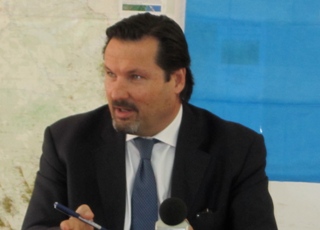UN: Insecurity, logistical challenges affecting southern returnees
By Julius N. Uma
January 16, 2010 (JUBA) – Plans by the southern government and its development partners to address humanitarian needs of thousand of southerners returning home still face serious logistical and humanitarian challenges, George Charpentier, the UN Humanitarian Coordinator in Sudan said Saturday.

The mass return of Southern Sudanese to the south has been triggered by the regions independence referendum, voting for which concluded on Saturday. Should the south vote to secede it will official become an independent state on July 9, as stipulated in the 2005 north-south peace agreement that ended decades of civil war.
According to the UN around four million people were displaced during the 21 year conflict, which resulted in the deaths of two million people, many from disease and starvation.
While acknowledging the recently issued government procedures on return, reinsertion and early reintegration, Charpentier said these procedures provide comprehensive guidance on registration, transportation and reception of returnees.
“The procedures initiated by the southern government play instrumental roles in the reinsertion and reintegration of these returnees into rural and urban areas. This will also influence the flow of returns,” the UN Humanitarian Coordinator said.
Charpentier, who just returned from an assessment mission in Warrap state, called for sustainable resettlement and reinsertion mechanisms among the southern population.
He also lauded efforts being put in by the Warrap state authorities, UN agencies and non-governmental organizations, who in partnership with local communities have promoted livelihoods in areas of resettlement.
Already, surveyors are being deployed to boost capacities of state ministries of physical infrastructure to plot and allocate land, courtesy of support provided by United Nations Development Programme (UNDP).
Last week, it emerged that food security needs and reduction in maternal mortality rates top the UN’s post-referendum agenda for this year.
Lise Grande, the Deputy Resident and Humanitarian Coordination for Southern Sudan told Sudan Tribune the UN had already earmarked funds meant to cater for the emergency food needs of an estimated 1.4 million southerners.
Last year, the organization launched an appeal for about $64 million emergency humanitarian funds as part of its post-referendum contingency plan. The initiative, dubbed, the “common humanitarian fund” attracted contributions from the US, European Union, UK, Canada, and Norway, among others.
In addition, Grande said, the UN will also intervene to boost education, building capacities and addressing the rule of law.
(ST)

DOOR
UN: Insecurity, logistical challenges affecting southern returnees
Please don’t throw your cigarette Ends on the floor the cockcroaches are getting cancer.
Deng E. Manyuon
UN: Insecurity, logistical challenges affecting southern returnees
The issue of returnees or Internally Displaced Persons (IDPs) from the North to the new state is very challenging. It is a great challenge which lies ahead. Our Government in the South and its development partners need to urgently address this issue.
Deng